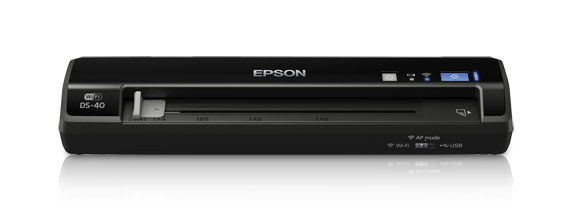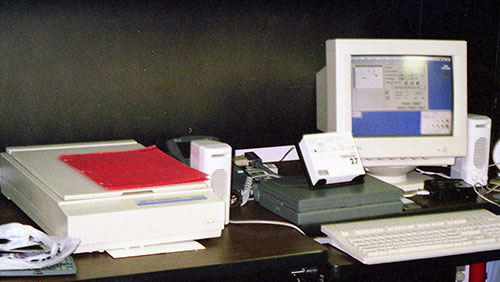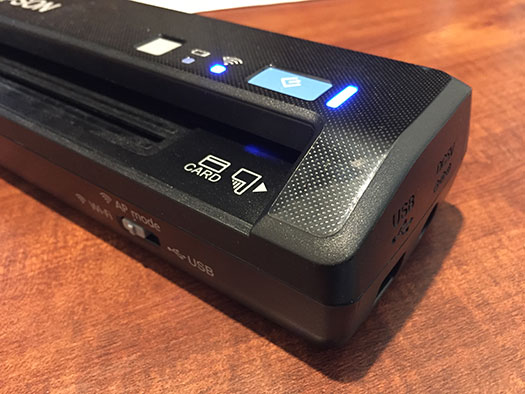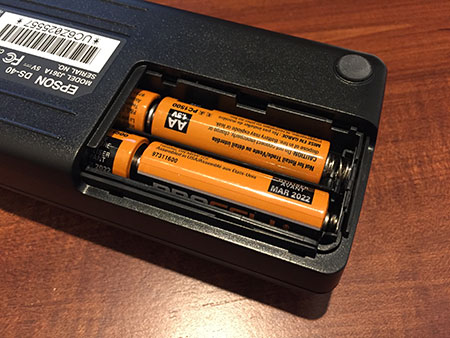
I've always been fascinated by digital scanners; my Dad worked in an industry that allowed him access to some of the newest tech in terms of computing, so I was able to use a full-color (16-bit!) digital scanner hooked up to an early Mac IIci running Photoshop when most people still used computers with 8-bit displays.

My very-old 3-pass color scanner connected to a PowerBook 180c. It took over a minute per scan—and much longer at 'photo' resolutions.
Scanners have advanced quite a bit since then—instead of waiting 5-10 minutes for one color scan (the scanner had to make one pass with each color filter, then the computer would assemble the scans into a single RGB image), you can scan hundreds of documents per minute with the best 'document workstation' devices.
I've always had a scanner of some sort—most recently an all-in-one inkjet or laser printer/copier/scanner—and the convenience has been nice. But ever since the NeatReceipt scanners were introduced, I've pined for a device that would be let me stick any kind of flat medium in it, wherever I wanted (e.g. upstairs at my desk, or at the kitchen counter, etc.), and it would upload a scan to Dropbox (or some other location). Bonus points for never having to use a computer to do any of the scanning.
So when I found an Epson DS-40 on sale for $89 (normal price is $119), I decided to take the plunge and see if these little portable document scanners were finally to a point where the convenience was worth the price.
Hardware and Setup
Out of the box, you get the scanner, a USB cable, and some cleaning accessories (a 'wet' cleaning sheet, single-use, and a 'dry' cleaning sheet). It would be nice if an AC adapter were included, since Epson's official power adapter costs $30, but the headline feature of this device is battery-powered portability.

The device itself feels sturdy, the base is grippy on any of the surfaces I've placed it, and the buttons feel durable and clicky—with the exception of the little plastic WiFi mode switch. Lucky for that switch, you may only need to use it once during the WiFi networking setup (if you use the scanner on one network and don't bring it around to different environments).
Setup was a bit annoying, and I'd say it's the number one gripe I have with this Epson scanner. The software was a little buggy at first, until I realized I had to go to Epson's website and download a slightly newer version. Then I found that I was only able to set up the scanner via USB connection, not via the WiFi hotspot the scanner could create. Once I got the Epson software to recognize the scanner, things worked pretty well and it could maintain a stable connection.
Power usage and batteries
When I received the scanner, I popped in a set of 4 AA batteries I had in my desk:

Alkaline will do in a pinch, but get some rechargeable batteries for the long haul.
After those batteries ran out of juice, I put in a set of Eneloop rechargeable AA batteries, and I rotate one freshly-charged set with all my battery-powered devices (e.g. keyboards, kids' toys, the scanner, etc.). Like I mentioned earlier, Epson offers a 5V DC power supply/wall wart for those who don't want to run through batteries. You can buy the OEM power supply from Epson (it's about $25), or you can look on Amazon for a suitable substitute (usually $15 plus shipping).
In my usage, a set of rechargeable AA batteries gets around 50-80 scans on WiFi. With how cheap Eneloop batteries are—and especially since they can be recharged thousands of times—I have no reservations using only battery power for this scanner. In the past, when alkaline batteries were the only option, it was often better to have the AC adapter on hand, but that's no longer the case!
Scanning with EPSON Scan and Document Capture
Instead of just one utility, there are two separate scanning utilities Epson includes. The first, Document Capture, seems to be targeted at quick one-document scans. You can set up a preset, say, for a color photograph scan. Then you put your photo in the scanner, click the button, and a few seconds later the photo is scanned and stored wherever you configure it to be stored in the preset.
This is helpful for bulk-scanning individual items like paper receipts, but I often have a stack of papers with some single-page receipts, some multiple-page documents, etc., so I opt for EPSON Scan, which is the traditional and more fully-featured scanning utility. EPSON Scan allows single or multiple-page scans (though the process is a little clunky), and you can set up many presets within.
Once you click scan, a letter-sized sheet feeds through the scanner in about 8 seconds:
The software is generally stable, with one major exception: after scanning one page in EPSON Scan, the 'progress bar' window remained on the screen indefinitely until I moved my mouse over the dialog. At that point, it jumped to the 'do you want to save this file or scan more pages' dialog. This bug appeared on macOS 10.11 and 10.12, but I didn't test on my Windows laptop to see if it's the same on Windows 10. There are a few little dialogs and processes that have strange interface quirks like this, but I've come to expect these quirks with any manufacturer's software. It seems manufacturers like Canon, Nikon, Epson, etc. always treat their device software as second-class citizens, and it's obvious they cut corners in QA and polish.
One important note (and a disappointment to me)—through WiFi, you can't use the button on the scanner to initiate a scan. That button only works when connected via USB. So my dreams of being able to walk around the house scanning things straight to Dropbox are still just that—dreams.
Another note is you can only use the scanner wirelessly with Epson's software. It may seem obvious after the fact, but other scanning utilities don't have any kind of universal WiFi scanner drivers, so they can only talk to the scanner if it's plugged in via USB.
Thoughts and Summary
The scan quality is decent, but won't rival that of a flatbed scanner, due to the scanned object being moved over the scanner. Also, due to the way the scanner works, you should be extremely careful to not scan anything with residue or staples—I accidentally scanned a document with small patch of sticky goo (that stuff that holds a card on a piece of paper), and it required two separate wet cleaning cloths before the scanner bar was clean enough to get a clear scan again. And there's still one pixel that causes a vertical black line in every letter-sized scann. Oops!
All-in-all, I'm happy with the scanner, and am pleased with the convenience, battery life, and results for under $100. The software could use some improvement, and you have to live with some limitations, but if portability is king, this is one of the best scanners I've seen or used—I normally stash it in my desk drawer, and pop it out whenever I have a new stack of receipts to scan. When finished, it goes back into the drawer and takes up very little room!
You can purchase the Epson DS-40 from Amazon.com for under $100.
Comments
Hi Jeff. I'm looking for a doc scanner like this that works with linux. Epson has official linux drivers for the ds-40 but the reviews are hit or miss on it. Have you tried it with linux by chance?
No, haven't had a chance. I did try it out on Windows 10, and it worked as reliably there as on my Mac. But I'd expect it to be more finicky on Linux judging by a few of the odd behaviors on my Mac.